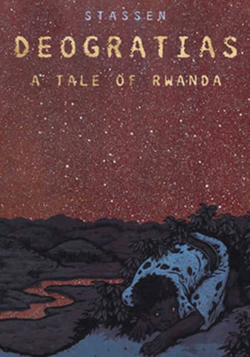- Deogratias
-
Deogratias: A Tale of Rwanda
(Déogratias)
Cover of the First Second edition by Jean-Philippe StassenMain character(s) Deogratias
Apollinaria
Benina
Brother PhilipPage count 96 pages Creative team Writer(s) Jean-Philippe Stassen Artist(s) Jean-Philippe Stassen Creator(s) Jean-Philippe Stassen Original publication Published in Dupuis Date(s) of publication October 2000 Language French ISBN 2-8001-2972-7 Translation Publisher First Second Books Date June 2006 ISBN 1-59643-103-2 Translator(s) Alexis Siegel Deogratias: A Tale of Rwanda is a graphic novel written and drawn by Jean-Philippe Stassen, published by First Second Books.
Contents
Publication history
The book was published in French in 2000 by Dupuis and has appeared in a number of different translations. It was translated into English by Alexis Siegel and published in 2006 by First Second.
Plot summary
The story takes place before, during, and after the genocide in Rwanda; told through parallel storylines. It is divided between the present day and Deogratias' flashbacks, denoted by black borders for the former and blank borders for the latter. It follows Deogratias, a Hutu teenager who has been unstable ever since his two Tutsi friends died in the genocide. The story begins after the genocide. Deogratias is at a bar and meets some old friends. Deogratias has flashbacks to his life before the genocide. He remembers the crush he had on the two girls and how he tried to spend time with them. In the flashbacks, Deogratias wasn't always a good person. We meet other people in the story. The two tribes in the country didn't get along. Deogratias was a bit caught in the middle of the feud. His life after the genocide seems very bad.
In day three of Deogratias returns to the town looking for urwagwa (banana beer) because he is turning into a dog again, but doesn't. Because he talks to Julius about killing the Tutsis, then he begins to think of how the father and brother Philip left and the others stayed and hid.
Characters
Deogratias - The main character of the book. He is a Hutu boy in Rwanda during the genocide. He struggles between good and evil actions throughout the novel . He also becomes mentally unstable as the book continues. He continuously turns into a dog to represent him changing into one of the people who are killing the Hutu and Tutsis.
Venetia - Venetia is the mother of Benina and Apollinaria. She is a prostitute, soliciting in a sexual manner.
Apollinaria - A Tutsi girl who works with the church. Deogratias pines after her though she denies him. She is very angered by the thoughts of being called a cockroach and is protective of her sister when she finds out early in the book that she is in a relationship with Deogratias.
Benina - Half sister of Apollinaria. she is also Tutsi. She is involved in a romantic relationship with Deogratias.
Brother Philip - A young man who goes to Rwanda in order to try to bring religion and civility to the Rwandans. Who also at the end lets Deogratias confess to him and listen to all of Deogratias' stories.
Father Prior Stanislas - Deogratias steals money from this father of the church in Rwanda, catching him in a lie. He is known to have an affair with Venitia, and also is Appollinaria’s father.
Julius - A leader in the Hutu militia called the “interahamwa"
Bosco - An officer in the Tutsi-led Rwandan Patriotic Front.
Sergeant/The French man -he is the head of Deogratias’ group
Themes
The main theme of the book is regret; the past constantly comes back to haunt Deogratias, be it of the genocide itself or his misdeeds. Other major themes include dehumanization, addiction, and post-traumatic stress disorder, which are all connected. At several points in the story, Deogratias, scarred by everything that has happened, physically and figuratively transforms into a dog (possibly literally at the end, as a policeman carries him off like a dog). He drinks banana beer to transform back into a human, claiming "...I am not a dog."
Early on, Deogratias stops the Frenchman from swatting a cockroach; regarding the "cockroach" slur used by Hutu extremists to describe Tutsis, this shows that he regrets his actions during the conflict and wants to preserve what's left. Adding to the irony is that Benina and Apollinaria, both Tutsis, were like sisters to him, yet he aided in their deaths.
Editions
The various editions and translations include:
- French: Dupuis, 2000. ISBN 2-8001-2972-7
- Dutch: Uitgeverij Dupuis, 2000
- Purtuguese: ASA, 2005. ISBN 972-41-3372-9
- Itaalian : Nuovi Equilibri, 2005. ISBN 8872268729
- English: First Second, 2006. ISBN 1-59643-103-2
- Spanish: Planeta DeAgostini, 2008.
Critical reception
Deogratias received overwhelmingly positive reviews by a number of literary publications including Publishers Weekly who wrote: "The heartbreaking power of Deogratias is how it keeps the reader distant from the atrocities by showing the trivial cruelties of everyday life before and after the genocide."[citation needed]
Awards
The book won the 2000 René Goscinny award, the 2001 Angoulême International Comics Festival Media award and the 2007 "Best Reprint Publication" Glyph Comics Awards. It was also nominated for the Angoulême International Comics Festival Prize for Best Album and Prix de la critique in 2001.
The book also made the 2007 Young Adult Library Services Association list of "Great Graphic Novel for Teens".[1]
See also
Notes
References
- Déogratias at Bedetheque (French)
- Deogratias: A Tale of Rwanda (Uitgeverij Dupuis) at the Grand Comics Database
- Deogratias: A Tale of Rwanda (First Second) at the Comic Book DB
External links
- Déogratias at Dupuis.com
- Deogratias at Macmillan
Reviews
- Review of Stassen's Deogratias at the Comic Book Bin
- Review at Curledup.com
Categories:- 2006 books
- 2006 in comics
- Dupuis titles
- French graphic novels
- Historical fiction
- Works about the Rwandan Genocide
Wikimedia Foundation. 2010.
